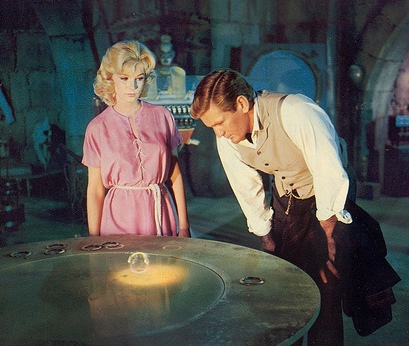Weena shows the Time Traveler boxes of golden rings.
"Are these the talking rings?" he asks.
"Yes."
"They speak?"
"Yes."
"Of what?"
"Things no one here understands."
Weena takes a ring from him, places it on its edge like a coin, and spins it on the smooth surface of a porcelain block. A disembodied voice fills the hall: "Whomsoever chances upon these rings will probably hear the last recorded voice of civilized man. This is the year 4829." Talking rings were an imagined invention of the mid-20th century movie The Time Machine; they did not exist in the original 19th-century novella by H.G. Wells. But the future has arrived much faster than anticipated, as it often does. Even the concept of talking rings seems a bit antiquated to us. And by the time audiobook skull implants are perfected, earbuds will seem so early 21st century.
Talking rings were an imagined invention of the mid-20th century movie The Time Machine; they did not exist in the original 19th-century novella by H.G. Wells. But the future has arrived much faster than anticipated, as it often does. Even the concept of talking rings seems a bit antiquated to us. And by the time audiobook skull implants are perfected, earbuds will seem so early 21st century.
The annoying thing about the future is that it's generally... unforeseeable. Maybe that's why laughing nervously about the past has always been such a popular spectator sport for us. So let's continue our celebration of Audiobook Month with a glimpse back to one of the industry's unsung pioneers.
In the September 1953 issue of Harper's magazine, Frederick Lewis Allen profiled Raymond Tierstein--founder of the Audio Book Company--and noted that his "contribution is to make talking books 'practical,' by which is meant cheap and convenient. To demonstrate this, he produced another object, this time out of the black bag. It was an album of twenty-four little records weighing only half an ounce each."
Tierstein had been showing his invention to commercial book publishers "to see what they thought. Evidently, like birds by a snake, they were fascinated and horrified," Allen wrote. "There were those who looked upon Mr. 'T's gadget as a menace to book publishing, a rival to their established methods. There were those who took a very lofty tone and said, in effect, that such a gadget was just one more sop to the masses who were lazy enough about reading as it was. How, they wanted to know, could you ever hope to improve the reading habits of Americans if you gave them such an easy out as this?"
Some publishers were not quite so aghast, and even considered talking books "an interesting new medium of communication." Tierstein had hoped they might see the Audio Book Company as a kind of printer, and he "would have been happy to leave to the publisher the matters of editorial selection and such problems as who read what books into the microphone; he would merely take care of the manufacturing," Allen noted.
"Well," Tierstein said, "They talked and talked and talked, but each publishing house was so divided in its opinions that nothing ever happened. So we decided to go into the 'publishing business' ourselves."
The future of talking books was uncertain then, as now. Allen reassured his audience that regardless of whether the nascent technology turned out to be a legitimate field for traditional publishers, "it does seem to me that they need not fear them as competition. People who are avid readers are never going to be satisfied with anything that goes so slowly as being read aloud to; they never have been.... It seems improbable that any manufacturer would go to the expense and trouble of putting any really bad books on records; only a book of substance can stand the test of being read aloud, and it will be impossible to skim a talking book."
Using an early variation on the theme promoted by some current and optimistic analysts--that e-books will attract new readers--Allen observed that it was "hard to avoid the analogy with the effect of radio on the sales of recordings, though only time will tell if it is appropriate. You will recall that the record manufacturers were afraid that the radio would put them out of business. Instead the habit of listening to music on the radio ultimately increased the sale of recordings and also the attendance at concerts. There are many people who like to listen but dislike to read. Isn't it possible that the book publishers might legitimately provide books for listeners? Might they not, in the long run, increase the sale of books and revive the now dying delights of reading aloud?"
Welcome to the ever-evolving world of talking rings, where the future may be unpredictable but the roots are ancient. "Like to listen to a little bit of The Iliad?" Tierstein asked at one point during his interview. "You know it was meant to be spoken in the first place."--Robert Gray (column archives available at Fresh Eyes Now)

